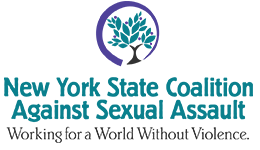05 Jul NYSCASA Honors Disability Pride Month
This month, NYSCASA joins disabled community members in honoring Disability Pride Month, which has been celebrated in July since 1990. Disability Pride Month commemorates the passage of the Americans with Disabilities Act (ADA) on July 26, 1990.
Disability pride challenges the dominant idea that disability is inherently negative. Disability pride celebrates people with disabilities and chronic illnesses; it means honoring disability as a component of human diversity. It is also an act of reclaiming visibility in public, because people with disabilities have historically been excluded from public spaces due to systemic ableism—including stigma, barriers to access, criminalization, and violence.
People with disabilities are 2 to 3 times more likely to experience violent victimization than people without disabilities. Rates of victimization are higher for people with disabilities who are Black, Indigenous, or other people of color, LGBTQIA2S+, and people of marginalized genders. People with disabilities have a heightened risk of experiencing violence due to ableism, racism, isolation, and the systemic devaluation of people with disabilities in our society. These factors create barriers to accessing help that make survivors with disabilities more vulnerable to further abuse and violence. Non-disabled people can also develop disabilities or chronic illnesses as a result of abuse and violence.
Throughout the month of July, NYSCASA will be sharing information and resources about disability justice, disability pride, and strategies to prevent and respond to violence against people with disabilities on our social media platforms.
This month, and every month, NYSCASA proudly supports our disabled community members. If you have experienced sexual abuse, harassment, or assault, we believe you and you are not alone.
Resources for Survivors with Disabilities:
- Connect with a victim advocate using the New York State Hotline for Sexual Assault and Domestic Violence: 1-800-942-6906
- Connect with a victim advocate using the Barrier-Free Living Hotline: 1-212-533-4358 or email info@bflnyc.org (Monday through Friday 9 AM – 5 PM)
- Connect with a victim advocate using the Barrier Free Living Deaf Services Video Phone: 1-646-807-4013 or email info@bflnyc.org (Monday through Friday 9 AM – 5 PM)
- Connect with an advocate at the New York State Justice Center for the Protection of People with Special Needs: 1-800-624-4143 or supportcoordinator@justicecenterny.gov
- Connect with a Peer Mental Health Advocate at Project LETS: https://projectlets.org/pmhas
- Survivor Support Packet (Massachusetts Advocates Standing Strong) – This resource has information specific to Massachusetts, but survivors with disabilities in New York State may find it helpful.
- For Patients: Having a Conversation with your Medical Provider About Sexual Violence
Resources for Allies and Advocates:
- Radical Disability Allyship (special journal issue from the Invisible Disability Project)
- Talk About Sexual Violence (The Arc)
- Safety Planning with People with Disabilities and Deaf People: A Working Guide (SAFE)
- Toolkit: Supporting Crime Victims with Disabilities (National Resource Center for Reaching Victims)
- Past webinar: Providing Accessible and Effective Services to Survivors of Sexual Assault with Disabilities (End Abuse of People with Disabilities)
- Past webinar: Intersectionality, Disability and Victimization (End Abuse of People with Disabilities)
- Past webinar: Safety and Assistive Technology (End Abuse of People with Disabilities)
- Past webinar: Serving Students with Intellectual and Developmental Disabilities, Part I
- Past webinar: Serving Students with Intellectual and Developmental Disabilities, Part II
- Past webinars: Disability Justice & Violence Prevention
Resources for Further Learning:
- Understanding Disability Pride Month (Krystal Jagoo)
- Disability Pride Month: Honoring Disabled Joy, Activating Social Change (Lucy Trieschmann)
- Changing the Framework: Disability Justice (Mia Mingus)
- What Is Disability Justice? (Sins Invalid)
- 10 Principles of Disability Justice (Sins Invalid)
- Additional resources from Sins Invalid
- Additional resources on Disability Justice from Project LETS
- Additional resources in the End Abuse of People with Disabilities Resource Library

